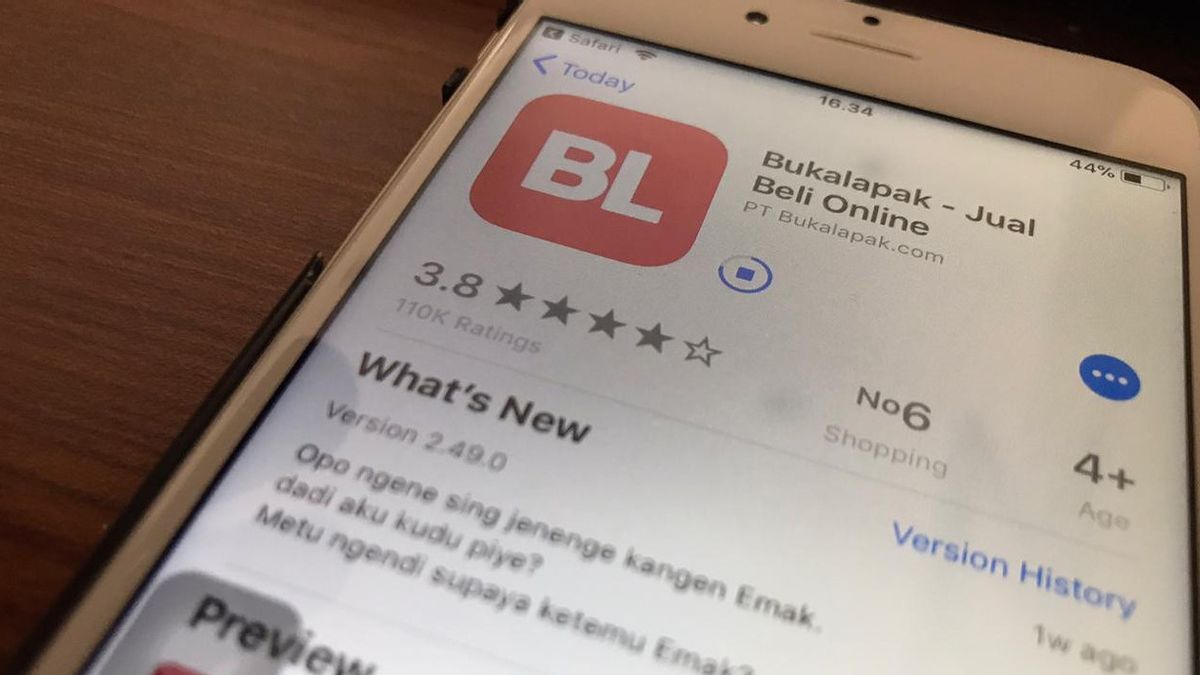JAKARTA - The Indonesian Consumers Foundation (YLKI) noted that in 2019 there were 1,871 consumer complaints. Complaints are divided into two, namely individual and group or collective.
There were 1,308 complaints in groups or collectively and individually as many as 563 complaints. YLKI took 10 categories of complaints from the total number, namely banking, online loans, housing, online shopping, leasing, transportation, electricity, telecommunications, insurance, and public services.
YLKI also detailed that the case was dominated by banking-related complaints totaling 106 complaints, online loans 96 complaints, housing 81 complaints and online shopping reaching 34 complaints.
In addition, leasing (32 complaints), transportation (26 complaints), electricity (24 complaints), telecommunications (23 complaints), insurance (21 complaints) and public services reached 15 complaints.
Discussing 34 complaints on online shopping, based on YLKI data, online shopping problems are divided into eight categories. First, 28.2 percent of ordered goods were not received. Second, 15.3 percent of the ordered goods did not meet the specifications. Third, refund 15.3 percent.
"Fourth, the transaction system is 12.8 percent. Fifth, fraud is 12.8 percent. Sixth, others are 7.6 percent. Seventh, the server system is 5.1 percent. Then, account hijacking is 2.5 percent," he said. YLKI Complaints Officer Rio Priyambodo, at the YLKI office, Jalan Duren Tiga, South Jakarta, Tuesday, January 14.
Rio explained that the online business actor who received the most complaints was Bukalapak with a complaint achievement of 17.6 percent.
"JD.ID is also the same as Bukalapak 17.6 percent. Then Shopee is in third place, 14.7 percent. Followed by Tokopedia 8.8 percent," he said.
Rio continued, there was also an e-commerce complaint with a World Price of 5.8 percent, OYO being calculated at 5.8 percent. Meanwhile, e-commerce related to tourism services Tiket.com had 5.8 percent of complaints. Booking.com, Etokobagus, Lazada, Nusatrip, Qoo1, Landor, Shopintar, and Super Bela each 2.9 percent.
YLKI Daily Executive Chairman Tulus Abadi said, on average, complaints related to e-commerce were the difficulty of complaints made by consumers due to communication with machines.
Tulus suggested, to facilitate consumer complaints against business actors, there must be interactions with humans. According to him, it is indeed a form machine of the effectiveness of digital technology, but access to complaints against humans that can be more dynamic should be opened.
"So we ask the government for each marketplace to handle complaints involving humans. There are human resources to handle it because machines are inanimate objects that cannot be compromised," explained Tulus.
Tulus admitted, the proposal to provide a complaint handling team in each of these marketplaces has often been submitted by his party to business actors.
"Earlier there was Whatsapp coming in, I don't know from the government or what, Bukalapak wants to meet me to discuss this matter," he said.
According to Tulus, the problem is not only in unresponsive customer service, but also education about system penetration. According to him, because of this low consumer literacy, eventually when making transactions there are many problems.
"So it departs from the lack of understanding or low consumer literacy. It is still lacking. On the one hand, the onslaught of the digital economy is so high and massive, but consumers are not aware of the aspects that must be understood," he said.
The English, Chinese, Japanese, Arabic, and French versions are automatically generated by the AI. So there may still be inaccuracies in translating, please always see Indonesian as our main language. (system supported by DigitalSiber.id)













